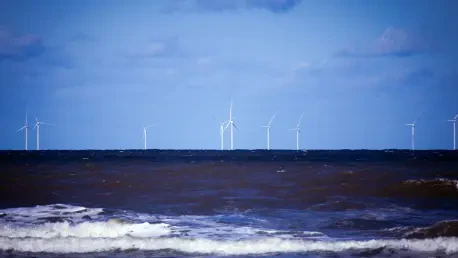Atlantic Shores Offshore Wind, a collaboration between EDF Renewables and Shell, has recently taken a decisive step in renewable energy by petitioning to terminate the renewable energy credits for their Atlantic Shores 1 project. This move highlights the difficulties encountered by this prominent wind energy initiative, particularly in overcoming regulatory and political hurdles. The decision to terminate the credits has raised questions about the viability and future of offshore wind energy in regions like New Jersey, where such projects play a crucial role in addressing clean energy goals.
Background and Filing for Termination
The Atlantic Shores 1 Project Overview
Atlantic Shores Offshore Wind’s ambitious project, known as Atlantic Shores 1, was envisioned as a cornerstone of renewable energy development off the coast of New Jersey. With a planned capacity of 1.5 gigawatts, the project aimed to contribute substantially to the state’s clean energy objectives. The initiative sought to harness the potential of offshore wind, capitalizing on New Jersey’s coastal location to generate sustainable electricity. However, the project’s journey has been fraught with challenges, leading the developers to petition for the termination of the offshore renewable energy credits (ORECs) associated with it.
In an appeal to the New Jersey Board of Public Utilities (NJBPU), Atlantic Shores emphasized the difficulties encountered due to shifting regulatory landscapes, unforeseen administrative barriers, and unfavorable macroeconomic conditions. Initially awarded under an Offshore Wind Renewable Energy Certificate Order in 2021, these credits were crucial to incentivize renewable energy production. Yet, unexpected hurdles, many stemming from the former administration’s policies, have created a complex environment that has impacted the project’s progress. The request for termination marks a significant step in reassessing the project’s feasibility under these evolving circumstances.
Challenges Confronting the Project
Despite meticulous planning and substantial investments, Atlantic Shores 1 has faced several formidable challenges that have impeded its development. A notable obstacle included the remanding of the project’s Clean Air Act permit by the Environmental Protection Agency’s (EPA) Environmental Appeals Board. The board’s decision, which Atlantic Shores contested on the basis of lacking “good cause,” added layers of uncertainty to an already challenging situation. The action demonstrated the intricate regulatory hurdles that such large-scale renewable energy projects must navigate.
Moreover, the project’s proponents pinpointed the profound impact of past government actions on their progress. The extensions and moratoriums imposed during the Trump administration disrupted the timeline and financial stability of the project. These delays were compounded by the inability to secure essential awards during NJBPU’s Fourth Solicitation, directly affecting the project’s trajectory. As a result, adjustments were necessitated, prompting the parent companies to reconsider their workforce and investment strategies. Shell and EDF’s financial reports reflected significant impairments, a clear indicator of the economic strains burdening the project.
Economic and Financial Ramifications
Financial Repercussions for Stakeholders
The financial implications of the halted Atlantic Shores 1 project have been noteworthy, with both EDF Renewables and Shell facing substantial economic setbacks. Shell’s financial performance in January, marked by a $1 billion impairment, underscored the gravity of the situation. This financial burden was portrayed as a “withdrawal” by EDF in its annual report, emphasizing the strained circumstances. The following month, EDF Renewables reported a $980 million impairment directly linked to the project’s suspension, further illustrating the breadth of financial challenges.
The financial strain borne by these energy giants highlighted the broader economic impact on the renewable energy sector. The cessation of the fourth offshore wind solicitation by the NJBPU added another layer of complexity, affecting not only Atlantic Shores but also other participants in the energy market. These developments resonate with the larger narrative within the renewable space, where fluctuating regulatory landscapes demand adaptive strategies and resilience from project stakeholders. The situation underscores the criticality of stable and supportive policy frameworks for the viability and sustainability of large-scale energy initiatives.
Broader Economic Implications
The challenges faced by Atlantic Shores hold broader implications for the renewable energy sector, particularly in understanding the intersection of policy, finance, and energy production. Termination of the credits sends ripples through investment communities and potential stakeholders, highlighting the need for reliable and consistent governmental support. It presents a case study on how shifts in policy can severely impact project timelines, financial stability, and investor confidence. The developments around Atlantic Shores 1 serve as a reminder of the intricate balance needed between public policy and private investment in driving forward renewable initiatives.
Moreover, the decisions taken by Atlantic Shores and their ensuing consequences reflect the complex interplay of market conditions and regulatory landscapes. In the ever-evolving landscape of energy policy, these dynamics prompt stakeholders to reassess strategies, adapt business models, and find paths that align with changing political and economic climates. These shifts underscore the essentiality of investing in research, innovation, and collaborative ventures to fortify the renewable energy industry against similar setbacks in the future.
Strategic Realignment and Future Outlook
Industry Insights and Adaptations
The move to terminate these renewable energy credits by Atlantic Shores reflects a larger theme within the renewable industry of adapting to changing regulatory and economic landscapes. It underscores the necessity for stakeholders to reassess motivations, strategic priorities, and long-term commitments in response to evolving conditions. This strategic realignment echoes across the energy sector, urging participants to develop more robust, flexible frameworks capable of withstanding political and economic uncertainties.
The broader industry now finds itself at a crossroads, needing to balance immediate challenges with long-term ambitions. The scenario underscores the importance of collaboration between governments, industry leaders, and financial institutions to create a supportive environment conducive to innovation and growth. Atlantic Shores’ experience serves as a touchstone for other renewable projects, offering valuable insights into navigating complexities through strategic agility and resilience. It prompts a broader reevaluation of how the renewable sector can reinforce its foundations to withstand looming uncertainties.
Prospects for Renewable Energy Projects
Atlantic Shores Offshore Wind, a joint venture formed by EDF Renewables and Shell, has recently made a significant move in the renewable energy landscape. They’ve filed a petition to terminate the renewable energy credits for the Atlantic Shores 1 project. This decision underscores the challenges faced by this major wind energy initiative, which has been complicated by regulatory and political obstacles. By opting to terminate the credits, several questions have been raised regarding the sustainability and future of offshore wind energy, particularly in states like New Jersey. Offshore wind projects are pivotal in helping regions meet their clean energy targets. However, this recent move might signal underlying issues within the project, prompting concerns about its feasibility. The termination of these credits could reflect broader challenges in the industry, suggesting that despite technological advances and increasing demand for clean energy, regulatory and market conditions still offer substantial hurdles for offshore wind projects to overcome.









